Kimmerer’s Stories Sustain Centre County Reads in 2022
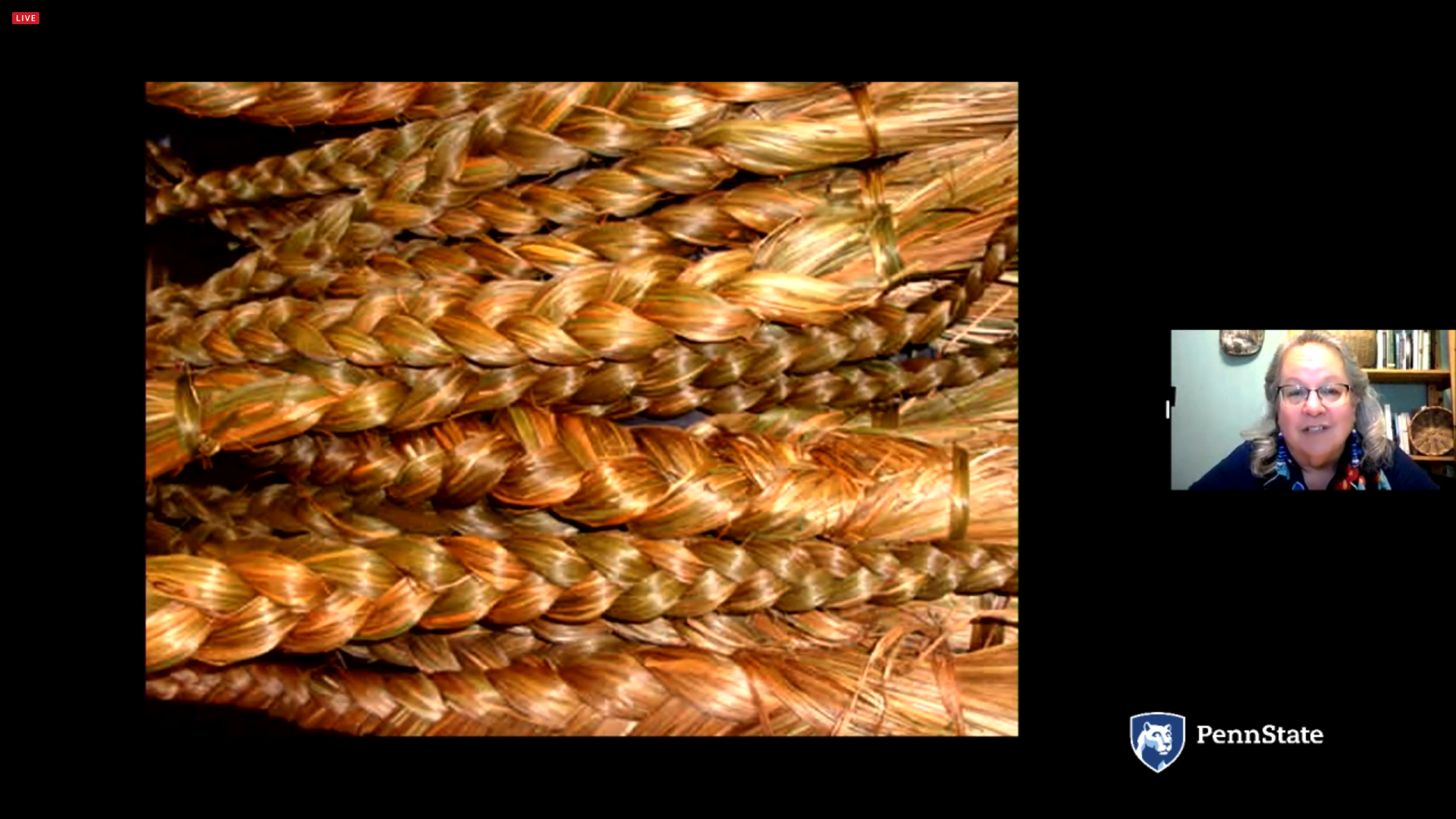
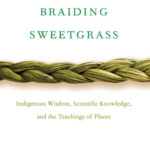 For 2022, the Centre County Reads program featured a hybrid slate of events to showcase Robin Wall Kimmerer’s bestselling nonfiction work Braiding Sweetgrass: Indigenous Wisdom, Scientific Knowledge, and the Teachings of Plants in the Centre County community in order to bring the community together to learn the stories of indigenous people. Throughout Braiding Sweetgrass, Kimmerer highlights how she uses her traditional ecological knowledge in her work as a botanist and plant ecologist, as well as in her everyday life, to cultivate a more sustainable relationship to the environment we live in and depend on. This year’s CCR programming was inspired by the need to learn more about indigenous ways of knowing, and engaging with Kimmerer’s stories provided the perfect way for participants to appreciate not only indigenous history and culture, but also in a greater sense the urgent need for environmental sustainability.
For 2022, the Centre County Reads program featured a hybrid slate of events to showcase Robin Wall Kimmerer’s bestselling nonfiction work Braiding Sweetgrass: Indigenous Wisdom, Scientific Knowledge, and the Teachings of Plants in the Centre County community in order to bring the community together to learn the stories of indigenous people. Throughout Braiding Sweetgrass, Kimmerer highlights how she uses her traditional ecological knowledge in her work as a botanist and plant ecologist, as well as in her everyday life, to cultivate a more sustainable relationship to the environment we live in and depend on. This year’s CCR programming was inspired by the need to learn more about indigenous ways of knowing, and engaging with Kimmerer’s stories provided the perfect way for participants to appreciate not only indigenous history and culture, but also in a greater sense the urgent need for environmental sustainability.
Programming began in January with a Book Club event at the Schlow Library—the first such event held in person since the beginning of the pandemic—where participants noted their appreciation for Kimmerer’s perspectives and felt encouraged to develop, following Kimmerer’s example, a more reciprocal relationship with nature. As Kimmerer describes in her book, this relationship is a much more intimate and personal one. Fittingly, many participants at this book club meeting listened to the audio book version narrated by Kimmerer herself, which they said allowed for a more intimate connection with her stories. Especially impactful in this regard were Kimmerer’s personal anecdotes about teaching her daughters the very same lessons the book itself hopes to teach readers. Several other book club events were held over February and March, with a mix of in-person and virtual options. Altogether, these book clubs were productive spaces for participants to learn about and appreciate indigenous history and culture.
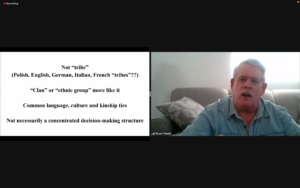 Learning this history is crucial given the proximity and historical significance of the Carlisle Indian Industrial School—which is located two hours away from State College and served as a national standard for assimilationist boarding schools across the country. Taking advantage of this “local” connection, this year’s programming hosted a virtual lecture by Bruce Teeple, a writer, speaker and historian, who serves as the Union County Historical Society’s president. Teeple’s presentation, “Native Americans of Central Pennsylvania,” addressed the rich and tragic history of the indigenous communities in the Centre County area, ranging from State College to the Susquehannah river. Teeple provided the audience with an in-depth understanding of the indigenous connections and roots to this area, describing common artifacts like arrowheads found there. Additionally, he gave an account of the hardships and violence faced by indigenous people at the hands of American colonists.
Learning this history is crucial given the proximity and historical significance of the Carlisle Indian Industrial School—which is located two hours away from State College and served as a national standard for assimilationist boarding schools across the country. Taking advantage of this “local” connection, this year’s programming hosted a virtual lecture by Bruce Teeple, a writer, speaker and historian, who serves as the Union County Historical Society’s president. Teeple’s presentation, “Native Americans of Central Pennsylvania,” addressed the rich and tragic history of the indigenous communities in the Centre County area, ranging from State College to the Susquehannah river. Teeple provided the audience with an in-depth understanding of the indigenous connections and roots to this area, describing common artifacts like arrowheads found there. Additionally, he gave an account of the hardships and violence faced by indigenous people at the hands of American colonists.
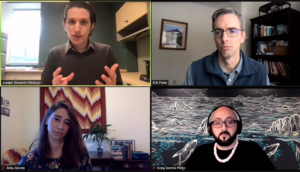 The discussions about indigenous culture did not stop with Teeple’s riveting presentation, however; it was followed by the CALS Roundtable in February. In “‘Carlisle In Reverse’: Returning to a Sustainable Future,” three featured panelists offered their perspectives on how to implement Kimmerer’s project of sustainability, inspired by indigenous ways of knowing. Panelist Craig Santos Perez, Associate Professor of English at the University of Hawaii at Mona, began the roundtable, and his remarks focused on the importance of language and naming, such as acknowledging the land’s original inhabitants and telling the history of that land. Abby Goode, Assistant Professor of English at Plymouth State University, argued Kimmerer’s book resists mythological agrarianism, which is a view that supports the nation’s non-indigenous farmers and obscures their appropriation of indigenous land. Finally, Erik B. Foley, Director of the Center for the Business of Sustainability and Instructor in Management and Organization at Penn State’s Smeal College of Business, expressed the need for more sustainable business practices and how businesses could serve as a catalyst for change. Moderated by CALS’s very-own Graduate Research Assistant, Joe Glinbizzi, the discussion supplemented and extended the project of Kimmerer’s book, of how individuals can live sustainably as well as what businesses and institutions, such as universities like Penn State, can do to acknowledge their contribution to centuries of harm done to the environment and indigenous populations. One suggestion the roundtable considered was the use of land-back programs by universities, which would help return land to the descendants of the original indigenous inhabitants.
The discussions about indigenous culture did not stop with Teeple’s riveting presentation, however; it was followed by the CALS Roundtable in February. In “‘Carlisle In Reverse’: Returning to a Sustainable Future,” three featured panelists offered their perspectives on how to implement Kimmerer’s project of sustainability, inspired by indigenous ways of knowing. Panelist Craig Santos Perez, Associate Professor of English at the University of Hawaii at Mona, began the roundtable, and his remarks focused on the importance of language and naming, such as acknowledging the land’s original inhabitants and telling the history of that land. Abby Goode, Assistant Professor of English at Plymouth State University, argued Kimmerer’s book resists mythological agrarianism, which is a view that supports the nation’s non-indigenous farmers and obscures their appropriation of indigenous land. Finally, Erik B. Foley, Director of the Center for the Business of Sustainability and Instructor in Management and Organization at Penn State’s Smeal College of Business, expressed the need for more sustainable business practices and how businesses could serve as a catalyst for change. Moderated by CALS’s very-own Graduate Research Assistant, Joe Glinbizzi, the discussion supplemented and extended the project of Kimmerer’s book, of how individuals can live sustainably as well as what businesses and institutions, such as universities like Penn State, can do to acknowledge their contribution to centuries of harm done to the environment and indigenous populations. One suggestion the roundtable considered was the use of land-back programs by universities, which would help return land to the descendants of the original indigenous inhabitants.
In addition to learning about how to foster a more informed and sustainable relationship to the environment, participants in this year’s programming also had the opportunity to contribute their own stories articulating the need for reciprocity. CALS’s “Sustaining Stories” Writing Contest offered four categories for participants to submit a piece of writing that—like Kimmerer’s stories in Braiding Sweetgrass—treats nature more like a person and partner than an object. Following Kimmerer’s lead, the winning pieces brilliantly depicted the necessity for a balance between giving and taking when interacting with the environment. The winners can be found here.
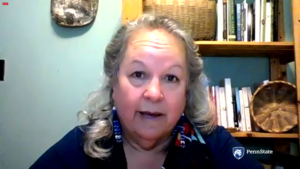 To round off the slate of events, Kimmerer herself gave a virtual lecture to the Penn State and Centre County communities. As a testament to Kimmerer’s broad appeal and influence, this year Centre County Reads joined with the Department of Landscape Architecture, the Arboretum at Penn State, and the Sustainability Institute to co-sponsor the author event, which was part of the Bracken Lecture Series. The event thus drew a wide and diverse crowd, with 446 audience members logging on to watch. Titled "The Fortress, the River and the Garden," Kimmerer’s lecture revisited the core concerns of Braiding Sweetgrass. Though it was a lecture, Kimmerer’s remarks did not abandon what she does best: the use of narrative and storytelling. In this case, Kimmerer described three different ways of relating to the environment as represented by three different metaphors: the fortress, the river and the garden. Ultimately, she advocated for the garden as a perspective that, by intertwining Western knowledge and traditional ecological knowledge, can most effectively encourage a sustainable relationship to the environment.
To round off the slate of events, Kimmerer herself gave a virtual lecture to the Penn State and Centre County communities. As a testament to Kimmerer’s broad appeal and influence, this year Centre County Reads joined with the Department of Landscape Architecture, the Arboretum at Penn State, and the Sustainability Institute to co-sponsor the author event, which was part of the Bracken Lecture Series. The event thus drew a wide and diverse crowd, with 446 audience members logging on to watch. Titled "The Fortress, the River and the Garden," Kimmerer’s lecture revisited the core concerns of Braiding Sweetgrass. Though it was a lecture, Kimmerer’s remarks did not abandon what she does best: the use of narrative and storytelling. In this case, Kimmerer described three different ways of relating to the environment as represented by three different metaphors: the fortress, the river and the garden. Ultimately, she advocated for the garden as a perspective that, by intertwining Western knowledge and traditional ecological knowledge, can most effectively encourage a sustainable relationship to the environment.
Even though this year’s read has ended in Centre County, the issues it engaged with have not and remain urgent. Kimmerer’s book not only served as a way for the community to connect and start the conversation toward a sustainable future, but also gave us the tools for sustaining the future right now.

 For 2022, the Centre County Reads program featured a hybrid slate of events to showcase Robin Wall Kimmerer’s bestselling nonfiction work Braiding Sweetgrass: Indigenous Wisdom, Scientific Knowledge, and the Teachings of Plants in the Centre County community in order to bring the community together to learn the stories of indigenous people. Throughout Braiding Sweetgrass, Kimmerer highlights how she uses her traditional ecological knowledge in her work as a botanist and plant ecologist, as well as in her everyday life, to cultivate a more sustainable relationship to the environment we live in and depend on. This year’s CCR programming was inspired by the need to learn more about indigenous ways of knowing, and engaging with Kimmerer’s stories provided the perfect way for participants to appreciate not only indigenous history and culture, but also in a greater sense the urgent need for environmental sustainability.
For 2022, the Centre County Reads program featured a hybrid slate of events to showcase Robin Wall Kimmerer’s bestselling nonfiction work Braiding Sweetgrass: Indigenous Wisdom, Scientific Knowledge, and the Teachings of Plants in the Centre County community in order to bring the community together to learn the stories of indigenous people. Throughout Braiding Sweetgrass, Kimmerer highlights how she uses her traditional ecological knowledge in her work as a botanist and plant ecologist, as well as in her everyday life, to cultivate a more sustainable relationship to the environment we live in and depend on. This year’s CCR programming was inspired by the need to learn more about indigenous ways of knowing, and engaging with Kimmerer’s stories provided the perfect way for participants to appreciate not only indigenous history and culture, but also in a greater sense the urgent need for environmental sustainability.
Programming began in January with a Book Club event at the Schlow Library—the first such event held in person since the beginning of the pandemic—where participants noted their appreciation for Kimmerer’s perspectives and felt encouraged to develop, following Kimmerer’s example, a more reciprocal relationship with nature. As Kimmerer describes in her book, this relationship is a much more intimate and personal one. Fittingly, many participants at this book club meeting listened to the audio book version narrated by Kimmerer herself, which they said allowed for a more intimate connection with her stories. Especially impactful in this regard were Kimmerer’s personal anecdotes about teaching her daughters the very same lessons the book itself hopes to teach readers. Several other book club events were held over February and March, with a mix of in-person and virtual options. Altogether, these book clubs were productive spaces for participants to learn about and appreciate indigenous history and culture.
 Learning this history is crucial given the proximity and historical significance of the Carlisle Indian Industrial School—which is located two hours away from State College and served as a national standard for assimilationist boarding schools across the country. Taking advantage of this “local” connection, this year’s programming hosted a virtual lecture by Bruce Teeple, a writer, speaker and historian, who serves as the Union County Historical Society’s president. Teeple’s presentation, “Native Americans of Central Pennsylvania,” addressed the rich and tragic history of the indigenous communities in the Centre County area, ranging from State College to the Susquehannah river. Teeple provided the audience with an in-depth understanding of the indigenous connections and roots to this area, describing common artifacts like arrowheads found there. Additionally, he gave an account of the hardships and violence faced by indigenous people at the hands of American colonists.
Learning this history is crucial given the proximity and historical significance of the Carlisle Indian Industrial School—which is located two hours away from State College and served as a national standard for assimilationist boarding schools across the country. Taking advantage of this “local” connection, this year’s programming hosted a virtual lecture by Bruce Teeple, a writer, speaker and historian, who serves as the Union County Historical Society’s president. Teeple’s presentation, “Native Americans of Central Pennsylvania,” addressed the rich and tragic history of the indigenous communities in the Centre County area, ranging from State College to the Susquehannah river. Teeple provided the audience with an in-depth understanding of the indigenous connections and roots to this area, describing common artifacts like arrowheads found there. Additionally, he gave an account of the hardships and violence faced by indigenous people at the hands of American colonists.
 The discussions about indigenous culture did not stop with Teeple’s riveting presentation, however; it was followed by the CALS Roundtable in February. In “‘Carlisle In Reverse’: Returning to a Sustainable Future,” three featured panelists offered their perspectives on how to implement Kimmerer’s project of sustainability, inspired by indigenous ways of knowing. Panelist Craig Santos Perez, Associate Professor of English at the University of Hawaii at Mona, began the roundtable, and his remarks focused on the importance of language and naming, such as acknowledging the land’s original inhabitants and telling the history of that land. Abby Goode, Assistant Professor of English at Plymouth State University, argued Kimmerer’s book resists mythological agrarianism, which is a view that supports the nation’s non-indigenous farmers and obscures their appropriation of indigenous land. Finally, Erik B. Foley, Director of the Center for the Business of Sustainability and Instructor in Management and Organization at Penn State’s Smeal College of Business, expressed the need for more sustainable business practices and how businesses could serve as a catalyst for change. Moderated by CALS’s very-own Graduate Research Assistant, Joe Glinbizzi, the discussion supplemented and extended the project of Kimmerer’s book, of how individuals can live sustainably as well as what businesses and institutions, such as universities like Penn State, can do to acknowledge their contribution to centuries of harm done to the environment and indigenous populations. One suggestion the roundtable considered was the use of land-back programs by universities, which would help return land to the descendants of the original indigenous inhabitants.
The discussions about indigenous culture did not stop with Teeple’s riveting presentation, however; it was followed by the CALS Roundtable in February. In “‘Carlisle In Reverse’: Returning to a Sustainable Future,” three featured panelists offered their perspectives on how to implement Kimmerer’s project of sustainability, inspired by indigenous ways of knowing. Panelist Craig Santos Perez, Associate Professor of English at the University of Hawaii at Mona, began the roundtable, and his remarks focused on the importance of language and naming, such as acknowledging the land’s original inhabitants and telling the history of that land. Abby Goode, Assistant Professor of English at Plymouth State University, argued Kimmerer’s book resists mythological agrarianism, which is a view that supports the nation’s non-indigenous farmers and obscures their appropriation of indigenous land. Finally, Erik B. Foley, Director of the Center for the Business of Sustainability and Instructor in Management and Organization at Penn State’s Smeal College of Business, expressed the need for more sustainable business practices and how businesses could serve as a catalyst for change. Moderated by CALS’s very-own Graduate Research Assistant, Joe Glinbizzi, the discussion supplemented and extended the project of Kimmerer’s book, of how individuals can live sustainably as well as what businesses and institutions, such as universities like Penn State, can do to acknowledge their contribution to centuries of harm done to the environment and indigenous populations. One suggestion the roundtable considered was the use of land-back programs by universities, which would help return land to the descendants of the original indigenous inhabitants.
In addition to learning about how to foster a more informed and sustainable relationship to the environment, participants in this year’s programming also had the opportunity to contribute their own stories articulating the need for reciprocity. CALS’s “Sustaining Stories” Writing Contest offered four categories for participants to submit a piece of writing that—like Kimmerer’s stories in Braiding Sweetgrass—treats nature more like a person and partner than an object. Following Kimmerer’s lead, the winning pieces brilliantly depicted the necessity for a balance between giving and taking when interacting with the environment. The winners can be found here.
 To round off the slate of events, Kimmerer herself gave a virtual lecture to the Penn State and Centre County communities. As a testament to Kimmerer’s broad appeal and influence, this year Centre County Reads joined with the Department of Landscape Architecture, the Arboretum at Penn State, and the Sustainability Institute to co-sponsor the author event, which was part of the Bracken Lecture Series. The event thus drew a wide and diverse crowd, with 446 audience members logging on to watch. Titled "The Fortress, the River and the Garden," Kimmerer’s lecture revisited the core concerns of Braiding Sweetgrass. Though it was a lecture, Kimmerer’s remarks did not abandon what she does best: the use of narrative and storytelling. In this case, Kimmerer described three different ways of relating to the environment as represented by three different metaphors: the fortress, the river and the garden. Ultimately, she advocated for the garden as a perspective that, by intertwining Western knowledge and traditional ecological knowledge, can most effectively encourage a sustainable relationship to the environment.
To round off the slate of events, Kimmerer herself gave a virtual lecture to the Penn State and Centre County communities. As a testament to Kimmerer’s broad appeal and influence, this year Centre County Reads joined with the Department of Landscape Architecture, the Arboretum at Penn State, and the Sustainability Institute to co-sponsor the author event, which was part of the Bracken Lecture Series. The event thus drew a wide and diverse crowd, with 446 audience members logging on to watch. Titled "The Fortress, the River and the Garden," Kimmerer’s lecture revisited the core concerns of Braiding Sweetgrass. Though it was a lecture, Kimmerer’s remarks did not abandon what she does best: the use of narrative and storytelling. In this case, Kimmerer described three different ways of relating to the environment as represented by three different metaphors: the fortress, the river and the garden. Ultimately, she advocated for the garden as a perspective that, by intertwining Western knowledge and traditional ecological knowledge, can most effectively encourage a sustainable relationship to the environment.
Even though this year’s read has ended in Centre County, the issues it engaged with have not and remain urgent. Kimmerer’s book not only served as a way for the community to connect and start the conversation toward a sustainable future, but also gave us the tools for sustaining the future right now.